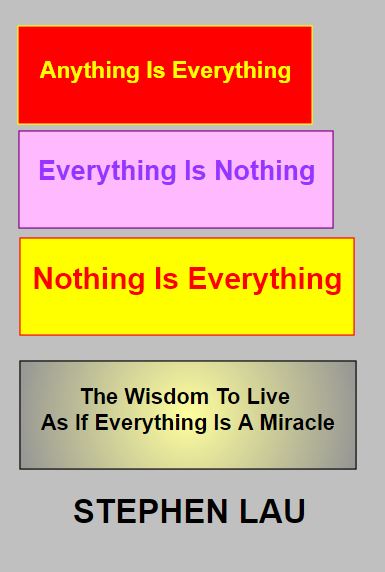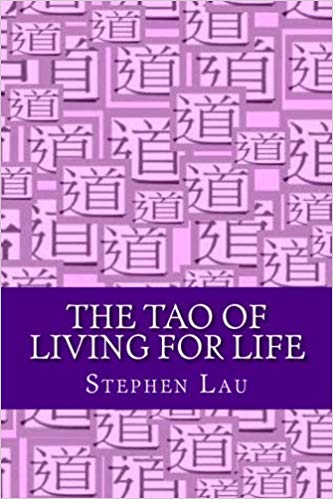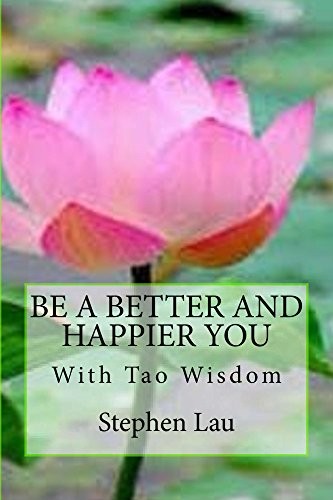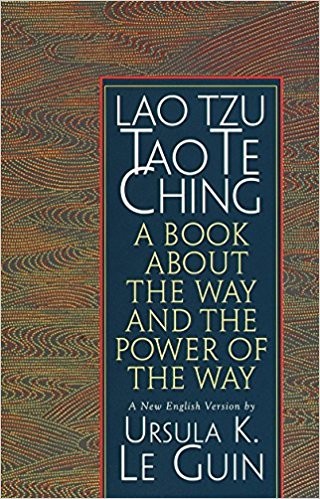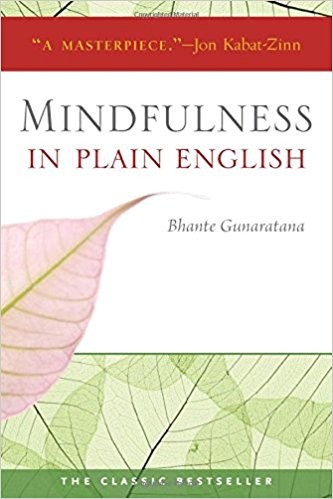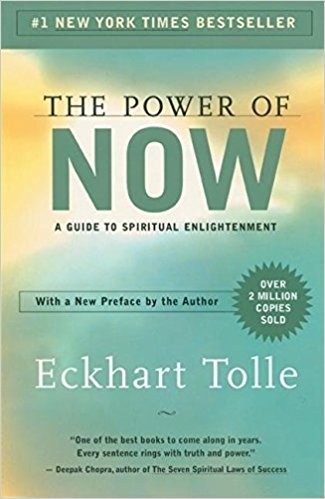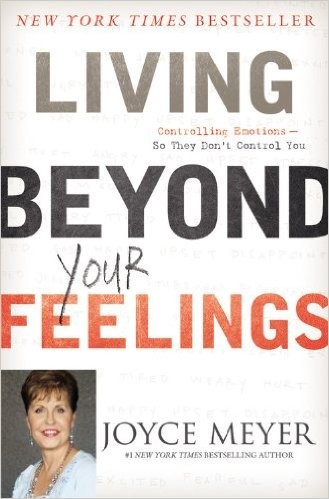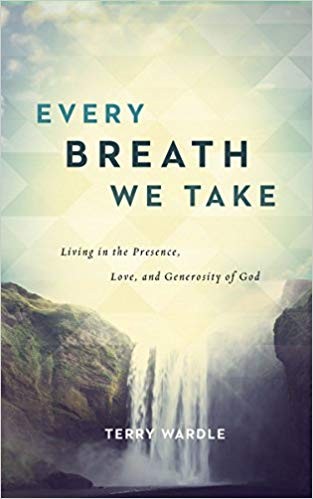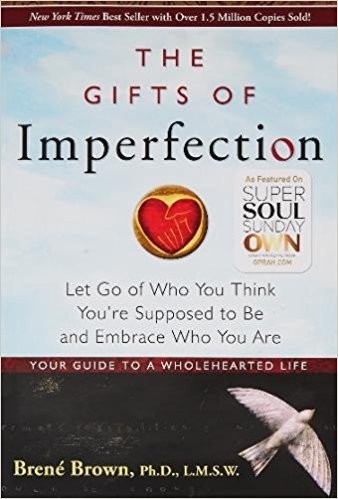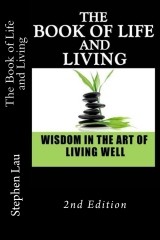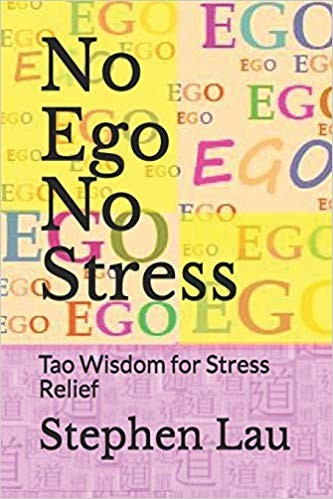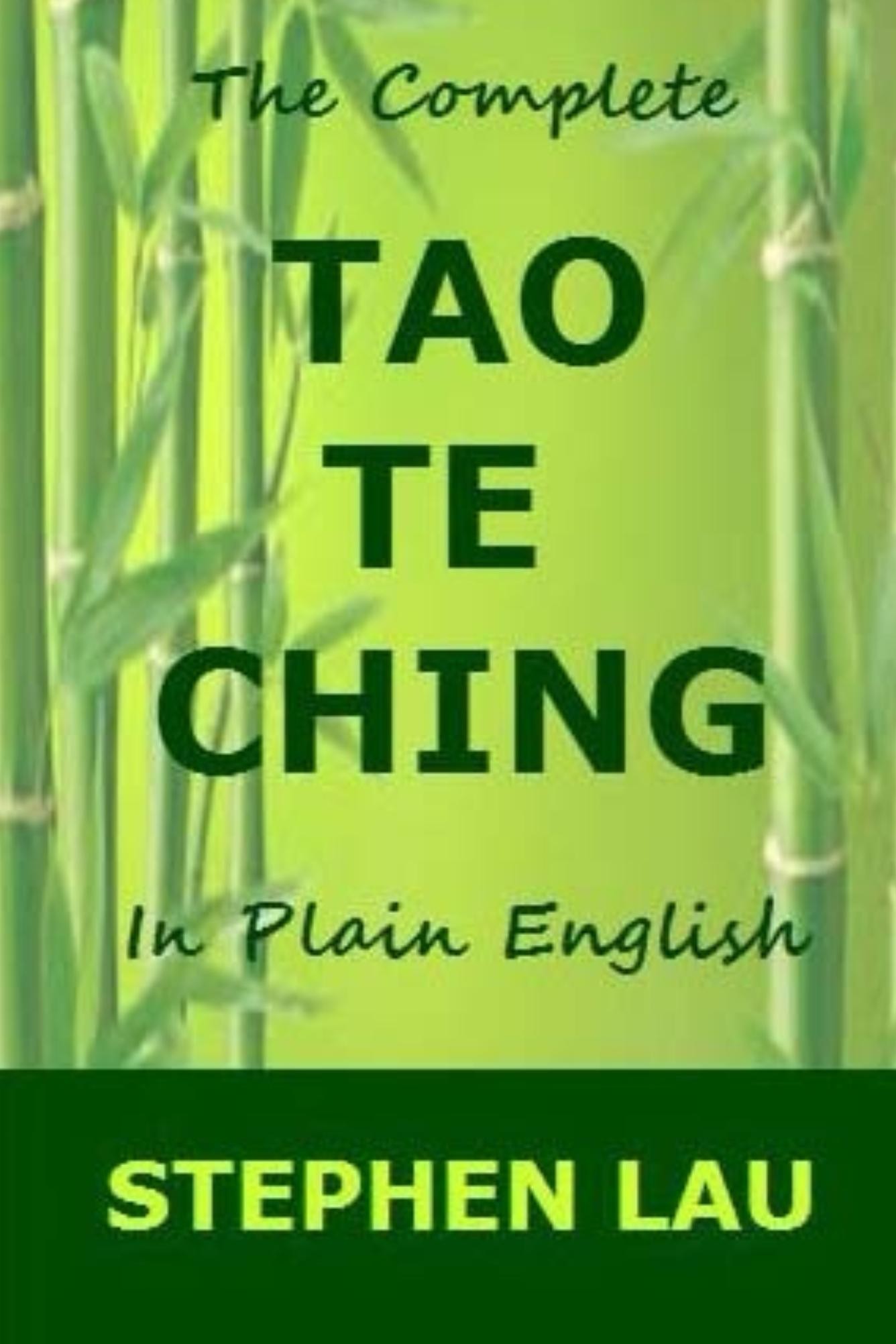
My Way! No Way! TAO Is The Way!
by
Stephen Lau
by
Stephen Lau


Stephen Lau's
book about happiness wisdom
book about happiness wisdom


The Complete TAO TE CHING in Plain English
by Stephen Lau
This book contains the 81 chapters of the translated text of the ancient Chinese classic on human wisdom, written by the Chinese sage Lao Tzu. It also explains in plain English the essentials of Tao wisdom, which is the wisdom of TAO TE CHING.
For more information, click here.
by Stephen Lau
This book contains the 81 chapters of the translated text of the ancient Chinese classic on human wisdom, written by the Chinese sage Lao Tzu. It also explains in plain English the essentials of Tao wisdom, which is the wisdom of TAO TE CHING.
For more information, click here.
Many are unhappy not because of what they have experienced throughout their life journeys, but because they don't have the human wisdom to perceive and process what they've experienced.
Happiness is a state of mind, due to the the perceptions of the human mind. Change your perceptions to change your so-called realities. Empower your mind with human wisdom -- ancient wisdom from the East and the West, conventional wisdom, and spiritual wisdom -- to think differently to have totally different perspectives of what may have made you happy or unhappy.
Looking at many examples of real people from all over the world may enlighten you, and help you live as if everything is a miracle.
To get your copy, click here.
To find out more about "happiness Wisdom", click here.
Happiness is a state of mind, due to the the perceptions of the human mind. Change your perceptions to change your so-called realities. Empower your mind with human wisdom -- ancient wisdom from the East and the West, conventional wisdom, and spiritual wisdom -- to think differently to have totally different perspectives of what may have made you happy or unhappy.
Looking at many examples of real people from all over the world may enlighten you, and help you live as if everything is a miracle.
To get your copy, click here.
To find out more about "happiness Wisdom", click here.


It is all about . . . .
TAO wisdom in a world of depression.
TAO is neither a religion nor a philosophy.
TAO is simply a way of life about the Way of life, that is, a general way of thinking about everything in life. It is a pathless path of humanity to live as if everything is a miracle.
TAO is the Way through anything and everything in life in order to fully experience them and live in balance and harmony. TAO is not about avoiding or getting out of anything unhappy and undesirable in everyday life, such as depression; rather, it is about going through depression by experiencing every aspect of it in order to become enlightened, if possible, with the profound human wisdom to continue living in peace and harmony in a world of depression.
TAO is looking at life not as a series of both happy and unhappy episodes, but simply as a journey of self-discovery and self-awakening to the real meaning of life existence. You are defined not by your words and thoughts, but by the ways you act and react, as well as the impact you may have on others around you. You exist not because you are simply here; you are here in this world to love and to learn how to live, as well as to help one another do the same.
The Outline of the Book:
(1) Introduction to Depression
(2) The Depressive Mind
(3) The Thinking Mind
(4) The Human Wisdom
(5) The Tao Wisdom
(6) The Way Through Depression
APPENDIX A: A Summary of Tao
APPENDIX B: Breathing
APPENDIX C: Mindfulness
APPENDIX D: About the Author
TAO wisdom in a world of depression.
TAO is neither a religion nor a philosophy.
TAO is simply a way of life about the Way of life, that is, a general way of thinking about everything in life. It is a pathless path of humanity to live as if everything is a miracle.
TAO is the Way through anything and everything in life in order to fully experience them and live in balance and harmony. TAO is not about avoiding or getting out of anything unhappy and undesirable in everyday life, such as depression; rather, it is about going through depression by experiencing every aspect of it in order to become enlightened, if possible, with the profound human wisdom to continue living in peace and harmony in a world of depression.
TAO is looking at life not as a series of both happy and unhappy episodes, but simply as a journey of self-discovery and self-awakening to the real meaning of life existence. You are defined not by your words and thoughts, but by the ways you act and react, as well as the impact you may have on others around you. You exist not because you are simply here; you are here in this world to love and to learn how to live, as well as to help one another do the same.
The Outline of the Book:
(1) Introduction to Depression
(2) The Depressive Mind
(3) The Thinking Mind
(4) The Human Wisdom
(5) The Tao Wisdom
(6) The Way Through Depression
APPENDIX A: A Summary of Tao
APPENDIX B: Breathing
APPENDIX C: Mindfulness
APPENDIX D: About the Author
My Way! No Way! TAO Is The Way!
by Stephen Lau
This is one-of-a-kind approach to depression, a mind disorder in a world of depression.
Unlike the conventional ways of avoiding depression, such as the use of exercise as distraction,.suppressing the symptoms, such as the use of affirmations or visualizations, and up lifting the depressive moods using medications, this new approach uses the ancient TAO wisdom from China to let you fully experience anything and everything in depression.
TAO wisdom is the way through depression, instead of avoiding it. You may become enlightened and free yourself of depression forever; if not, at least you may look at your depression differently.
To get your digital copy, click here; to get your paperback copy, click here.
by Stephen Lau
This is one-of-a-kind approach to depression, a mind disorder in a world of depression.
Unlike the conventional ways of avoiding depression, such as the use of exercise as distraction,.suppressing the symptoms, such as the use of affirmations or visualizations, and up lifting the depressive moods using medications, this new approach uses the ancient TAO wisdom from China to let you fully experience anything and everything in depression.
TAO wisdom is the way through depression, instead of avoiding it. You may become enlightened and free yourself of depression forever; if not, at least you may look at your depression differently.
To get your digital copy, click here; to get your paperback copy, click here.

For more information, go to the following:
ANYTHING IS EVERYTHING
EVERYTHING IS NOTHING
NOTHING IS EVERYTHING
ANYTHING IS EVERYTHING
EVERYTHING IS NOTHING
NOTHING IS EVERYTHING
The following is an excerpt from the book: "My Way! No Way! Tao Is The Way!"
A WORLD OF DEPRESSION
“Depression has been called the world's number one public health problem. In fact, depression is so widespread it is considered the common cold of psychiatric disturbances. But there is a grim difference between depression and a cold. Depression can kill you.“ David D. Burns
We all have a depressive mind because we are all living in a world of depression. The only difference is that our depression may all differ in intensity: slight, serious, or severe. The truth of the matter is that each and every one of us is depressed, without any exception, because we all experience our depressive episodes at some points during our lifespan, and it is very normal. However, many of us prefer to deny or ignore our emotional dysfunction due to the stigma that is often associated with depression.
Depression is not a new human disease or disorder; it is as ancient as man:
"so I have been allotted months of futility,
and nights of misery have been assigned to me.
4 When I lie down I think, ‘How long before I get up?’
The night drags on, and I toss and turn until dawn.
5 My body is clothed with worms and scabs,
my skin is broken and festering.
6 “My days are swifter than a weaver’s shuttle,
and they come to an end without hope.
7 Remember, O God, that my life is but a breath;
my eyes will never see happiness again.
8 The eye that now sees me will see me no longer;
you will look for me, but I will be no more.
9 As a cloud vanishes and is gone,
so one who goes down to the grave does not return.
10 He will never come to his house again;
his place will know him no more.
11 “Therefore I will not keep silent;
I will speak out in the anguish of my spirit,
I will complain in the bitterness of my soul." (Job 7: 3-11)
“Answer me quickly, Lord; my spirit fails. Do not hide your face from me or I will be like those who go down to the pit. Let the morning bring me word of your unfailing love, for I have put my trust in you. Show me the way I should go, for to you I entrust my life.”
(Psalm 143: 7-8)
In modern age, Sir Winston Churchill, the Prime Minister of Great Britain, underwent serious bouts of depression during his country's national crisis in World War II. The fact is that depression is no respecter of persons-even for those with very high I.Q., such as the Nobel Prize winning author Ernest Hemingway who committed suicide just as his father did with the comment “I’ll probably go the same way.” Indeed, many of us are vulnerable to this genetic mental disorder.
Sadly, depression is currently increasing at an alarming rate because the world we are now living in is getting more challenging, more complex, and more complicated each day passing-it has now become a world of depression.
The Realities of Depression
“Every age yearns for a more beautiful world. The deeper the desperation and the depression about the confusing present, the more intense that yearning.” Johan Huizinga
Depression is a mental disorder that affects not only the mind with its multiple moods, but also the overall wellness of the body as well as the whole being of an individual. Depression is an inner struggle striving to escape from the harsh realities of life.
The Origin
“Depression begins with disappointment. When disappointment festers in our soul, it leads to discouragement.” Joyce Meyer
Man is inherently desirous of happiness. We all want to become happy; without happiness, human existence may have become meaningless. Therefore, we all want to avoid unhappiness, and this self-defense mechanism may then develop into addictive habit patterns that have ultimately become some of the characteristics of our individual personality, affecting how we think. In other words, to avoid unhappiness, we may subconsciously begin to "lose contact with our realities" and thus become the persons we are not supposed to be. Depression is a mental struggle against unhappiness that an individual wishes to avoid, and in the process becomes a different person -- a person with ever-changing moods and temperaments.
A WORLD OF DEPRESSION
“Depression has been called the world's number one public health problem. In fact, depression is so widespread it is considered the common cold of psychiatric disturbances. But there is a grim difference between depression and a cold. Depression can kill you.“ David D. Burns
We all have a depressive mind because we are all living in a world of depression. The only difference is that our depression may all differ in intensity: slight, serious, or severe. The truth of the matter is that each and every one of us is depressed, without any exception, because we all experience our depressive episodes at some points during our lifespan, and it is very normal. However, many of us prefer to deny or ignore our emotional dysfunction due to the stigma that is often associated with depression.
Depression is not a new human disease or disorder; it is as ancient as man:
"so I have been allotted months of futility,
and nights of misery have been assigned to me.
4 When I lie down I think, ‘How long before I get up?’
The night drags on, and I toss and turn until dawn.
5 My body is clothed with worms and scabs,
my skin is broken and festering.
6 “My days are swifter than a weaver’s shuttle,
and they come to an end without hope.
7 Remember, O God, that my life is but a breath;
my eyes will never see happiness again.
8 The eye that now sees me will see me no longer;
you will look for me, but I will be no more.
9 As a cloud vanishes and is gone,
so one who goes down to the grave does not return.
10 He will never come to his house again;
his place will know him no more.
11 “Therefore I will not keep silent;
I will speak out in the anguish of my spirit,
I will complain in the bitterness of my soul." (Job 7: 3-11)
“Answer me quickly, Lord; my spirit fails. Do not hide your face from me or I will be like those who go down to the pit. Let the morning bring me word of your unfailing love, for I have put my trust in you. Show me the way I should go, for to you I entrust my life.”
(Psalm 143: 7-8)
In modern age, Sir Winston Churchill, the Prime Minister of Great Britain, underwent serious bouts of depression during his country's national crisis in World War II. The fact is that depression is no respecter of persons-even for those with very high I.Q., such as the Nobel Prize winning author Ernest Hemingway who committed suicide just as his father did with the comment “I’ll probably go the same way.” Indeed, many of us are vulnerable to this genetic mental disorder.
Sadly, depression is currently increasing at an alarming rate because the world we are now living in is getting more challenging, more complex, and more complicated each day passing-it has now become a world of depression.
The Realities of Depression
“Every age yearns for a more beautiful world. The deeper the desperation and the depression about the confusing present, the more intense that yearning.” Johan Huizinga
Depression is a mental disorder that affects not only the mind with its multiple moods, but also the overall wellness of the body as well as the whole being of an individual. Depression is an inner struggle striving to escape from the harsh realities of life.
The Origin
“Depression begins with disappointment. When disappointment festers in our soul, it leads to discouragement.” Joyce Meyer
Man is inherently desirous of happiness. We all want to become happy; without happiness, human existence may have become meaningless. Therefore, we all want to avoid unhappiness, and this self-defense mechanism may then develop into addictive habit patterns that have ultimately become some of the characteristics of our individual personality, affecting how we think. In other words, to avoid unhappiness, we may subconsciously begin to "lose contact with our realities" and thus become the persons we are not supposed to be. Depression is a mental struggle against unhappiness that an individual wishes to avoid, and in the process becomes a different person -- a person with ever-changing moods and temperaments.
The following is another excerpt from the book:
DEPRESSION AND LOVE OF MONEY
Get-rich-quick
The love of money may entice many people to engage in many get-rich-quick schemes, high-risk investments, or compulsive gambling, leading to debts and many financial disasters in their lives.
There was the story of a fool who was told that to satisfy his hunger, he had to eat four buns; he ended up eating only the fourth bun when he thought he could take a shortcut instead. In life, you have to work hard to earn your money, just as you have to eat all the four buns to satisfy your hunger, and not just the fourth one.
Buying lottery tickets is also like eating the fourth bun-another get-rich-quick mindset that many people embrace and entertain.
According to some psychology studies, the overall happiness levels of lottery winners spiked when they won, but returned to their pre-winning levels after just a few months when the thrills of winning wore off. In terms of their overall happiness, the lottery winners were neither significantly happier than the non-winners, nor were they happier than they were before their winnings. Research has shown that affective forecasting, which is predicting human future emotions, often makes humans overestimate the duration of their future emotional reactions.
Having said that, you might still think: “I still want to win the lottery, and let me be unhappy!”
TAO wisdom
According to TAO, money is neither positive nor negative; it is all in the human mind.
But how you make your money and how you spend your money may turn money into something either positive or negative.
To increase your wealth in a positive way, focus on doing what needs to be done, and no more. On the other hand, the more you do to make money, the less focused you become, and the greater are your expectations of the outcome. That may ultimately create not only undue stress but also internal disharmony in your life, turning money into something negative.
Increasing your wealth, however, does not necessarily mean spending your money proportionately. That is to say, an individual making more money does not have to buy a much bigger house than what that individual actually needs. To illustrate, Warren Buffet, the billionaire, has set an excellent example: he is still living in his $31,500 home he bought some decades ago.
Another classic example is Ann Russell Miller, a celebrated socialite from San Francisco, also known as Sister Mary Joseph, She, who had ten children and nineteen grandchildren, had grown up in luxury and privilege, and had been living a life of incredible wealth. Instead of shopping at Saks Fifth Avenue she used to do for decades-she suddenly decided to give up everything, and became a nun devoted to living in poverty for the rest of her life. That unbelievable event happened more than two decades ago: one day she held a celebrity party in which she announced her incredible decision, and her announcement was widely reported in the media across the United States. Why did she make such an incredible decision to drastically change her lifestyle? She said she her had a calling, a true vocation that was hard to understand for the general public, and even for the close members of her family.
Excessively increasing one’s wants often leads to unduly inflating one’s ego as well, and thus creating many negative attachments that are often packed in one’s own bag and baggage.
The late Robert Kennedy once said: “Sometimes I think that the only people in this country who worry more about money than the poor are the very wealthy. They worry about losing it, they worry about how it is invested, they worry about the effect it’s going to have. And as the zeroes increase, the dilemmas get bigger.”
Epicurus, the ancient Greek philosopher, rightly said that to lead a pleasant life one must avoid luxuries and live simply. The explanation is that luxurious living may make you into a needy person whose happiness depends on things that are easily lost.
The bottom line: the pleasures of all sensory stimulation are limited and short-lived, whereas the joy of TAO is unlimited and lasting. With less focus on your attachments to the pleasures of the material world, your heart will be more on your spirituality that will provide you with eternal joy.
“Stop accumulating riches by being smart.
Heavenly assets are freely available to all.”
(Lao Tzu, Tao Te Ching, Chapter 19)
Thinking questions
What has love got to do with money? How does love equate to money from your own perspective?
Did you do things with money that, in retrospect, did not seem to make much sense? If so, why did that happen? Can you now repack or unpack your bag and baggage?
Are your core values in alignment with your work and how you earn your money?
Do you have your priorities straight, and if so, does the way you spend money support those priorities?
Do you know the difference between your needs and your wants, and if so, do you take care of your needs first and wants second, or the other way around?
Do you know how your money is invested, and do those investments support you core values?
In future, will you still continue to buy the lottery ticket or the Power Ball?
Reflecting on how you have come to where you are right now may help you understand how all these years have built up your complex system of money beliefs in your subconscious mind, or why all your striving and hard work to get that elusive wealth that has always seemed so vitally important to you.
Now is the time to strip away all the “noise” in your life, the worry about debt, the fear of failure, the deeply buried beliefs about unworthiness that obscure the real you, and serve only to resist the flow of life within you.
Now is the time to fully understand that all your imaginary needs are no more than your wants; they are delusional, causing confusion and distress, and they could never be fulfilled anyhow. They are the underlying causes of your depression.
Never-ending cycle of acquisitions leads to clutter, burden, and self-imprisonment. Decrease is the beginning of letting go, which frees you from attachment, fear, and insecurity.
“When there is abundance, there is lacking.
When there is craving, there is discontentment.
Striving for power to control and influence
every aspect of our lives
is the source of our suffering.
Obsessed with getting and keeping,
many of us never really live before we die.
Following the Way,
we must learn to let go.”
(Lao Tzu, Tao Te Ching, Chapter 75)
Remember, you came into this world empty-handed, and now you expect to grab and hold on to everything when you leave. Does that make any sense to you? If you think that you would leave what you have to your children and grandchildren, then remember this: they, just like everyone else, have their own destinies that are totally beyond your or their own control.
DEPRESSION AND LOVE OF MONEY
Get-rich-quick
The love of money may entice many people to engage in many get-rich-quick schemes, high-risk investments, or compulsive gambling, leading to debts and many financial disasters in their lives.
There was the story of a fool who was told that to satisfy his hunger, he had to eat four buns; he ended up eating only the fourth bun when he thought he could take a shortcut instead. In life, you have to work hard to earn your money, just as you have to eat all the four buns to satisfy your hunger, and not just the fourth one.
Buying lottery tickets is also like eating the fourth bun-another get-rich-quick mindset that many people embrace and entertain.
According to some psychology studies, the overall happiness levels of lottery winners spiked when they won, but returned to their pre-winning levels after just a few months when the thrills of winning wore off. In terms of their overall happiness, the lottery winners were neither significantly happier than the non-winners, nor were they happier than they were before their winnings. Research has shown that affective forecasting, which is predicting human future emotions, often makes humans overestimate the duration of their future emotional reactions.
Having said that, you might still think: “I still want to win the lottery, and let me be unhappy!”
TAO wisdom
According to TAO, money is neither positive nor negative; it is all in the human mind.
But how you make your money and how you spend your money may turn money into something either positive or negative.
To increase your wealth in a positive way, focus on doing what needs to be done, and no more. On the other hand, the more you do to make money, the less focused you become, and the greater are your expectations of the outcome. That may ultimately create not only undue stress but also internal disharmony in your life, turning money into something negative.
Increasing your wealth, however, does not necessarily mean spending your money proportionately. That is to say, an individual making more money does not have to buy a much bigger house than what that individual actually needs. To illustrate, Warren Buffet, the billionaire, has set an excellent example: he is still living in his $31,500 home he bought some decades ago.
Another classic example is Ann Russell Miller, a celebrated socialite from San Francisco, also known as Sister Mary Joseph, She, who had ten children and nineteen grandchildren, had grown up in luxury and privilege, and had been living a life of incredible wealth. Instead of shopping at Saks Fifth Avenue she used to do for decades-she suddenly decided to give up everything, and became a nun devoted to living in poverty for the rest of her life. That unbelievable event happened more than two decades ago: one day she held a celebrity party in which she announced her incredible decision, and her announcement was widely reported in the media across the United States. Why did she make such an incredible decision to drastically change her lifestyle? She said she her had a calling, a true vocation that was hard to understand for the general public, and even for the close members of her family.
Excessively increasing one’s wants often leads to unduly inflating one’s ego as well, and thus creating many negative attachments that are often packed in one’s own bag and baggage.
The late Robert Kennedy once said: “Sometimes I think that the only people in this country who worry more about money than the poor are the very wealthy. They worry about losing it, they worry about how it is invested, they worry about the effect it’s going to have. And as the zeroes increase, the dilemmas get bigger.”
Epicurus, the ancient Greek philosopher, rightly said that to lead a pleasant life one must avoid luxuries and live simply. The explanation is that luxurious living may make you into a needy person whose happiness depends on things that are easily lost.
The bottom line: the pleasures of all sensory stimulation are limited and short-lived, whereas the joy of TAO is unlimited and lasting. With less focus on your attachments to the pleasures of the material world, your heart will be more on your spirituality that will provide you with eternal joy.
“Stop accumulating riches by being smart.
Heavenly assets are freely available to all.”
(Lao Tzu, Tao Te Ching, Chapter 19)
Thinking questions
What has love got to do with money? How does love equate to money from your own perspective?
Did you do things with money that, in retrospect, did not seem to make much sense? If so, why did that happen? Can you now repack or unpack your bag and baggage?
Are your core values in alignment with your work and how you earn your money?
Do you have your priorities straight, and if so, does the way you spend money support those priorities?
Do you know the difference between your needs and your wants, and if so, do you take care of your needs first and wants second, or the other way around?
Do you know how your money is invested, and do those investments support you core values?
In future, will you still continue to buy the lottery ticket or the Power Ball?
Reflecting on how you have come to where you are right now may help you understand how all these years have built up your complex system of money beliefs in your subconscious mind, or why all your striving and hard work to get that elusive wealth that has always seemed so vitally important to you.
Now is the time to strip away all the “noise” in your life, the worry about debt, the fear of failure, the deeply buried beliefs about unworthiness that obscure the real you, and serve only to resist the flow of life within you.
Now is the time to fully understand that all your imaginary needs are no more than your wants; they are delusional, causing confusion and distress, and they could never be fulfilled anyhow. They are the underlying causes of your depression.
Never-ending cycle of acquisitions leads to clutter, burden, and self-imprisonment. Decrease is the beginning of letting go, which frees you from attachment, fear, and insecurity.
“When there is abundance, there is lacking.
When there is craving, there is discontentment.
Striving for power to control and influence
every aspect of our lives
is the source of our suffering.
Obsessed with getting and keeping,
many of us never really live before we die.
Following the Way,
we must learn to let go.”
(Lao Tzu, Tao Te Ching, Chapter 75)
Remember, you came into this world empty-handed, and now you expect to grab and hold on to everything when you leave. Does that make any sense to you? If you think that you would leave what you have to your children and grandchildren, then remember this: they, just like everyone else, have their own destinies that are totally beyond your or their own control.
